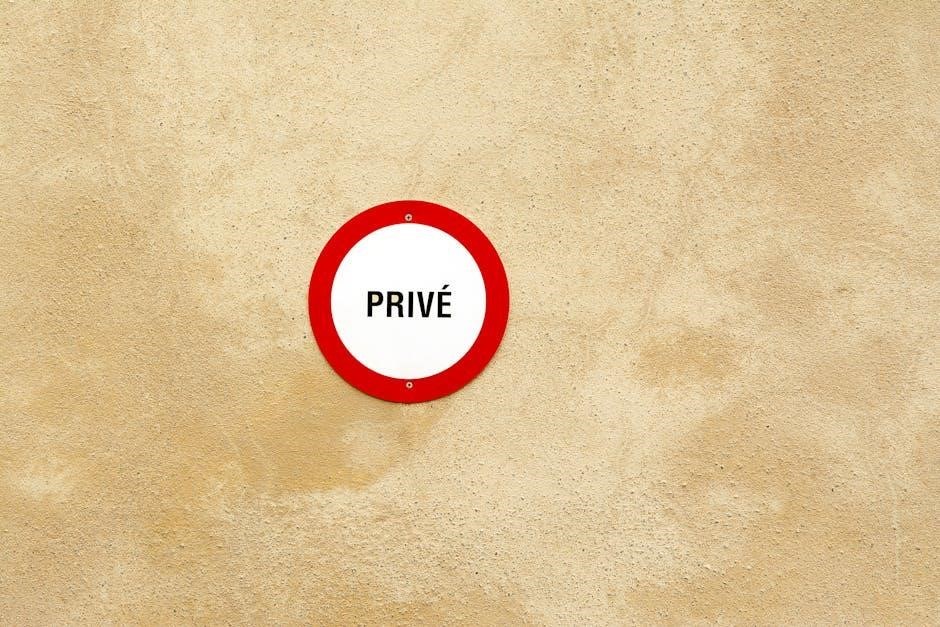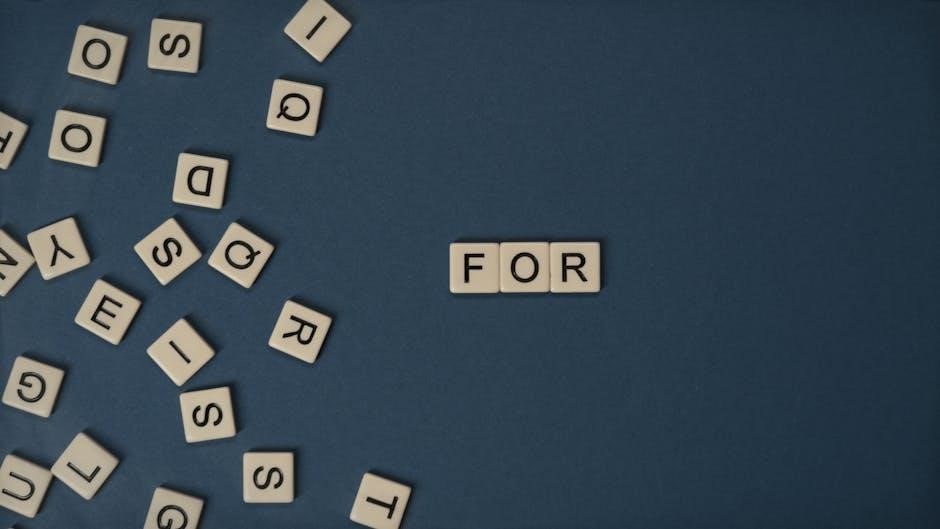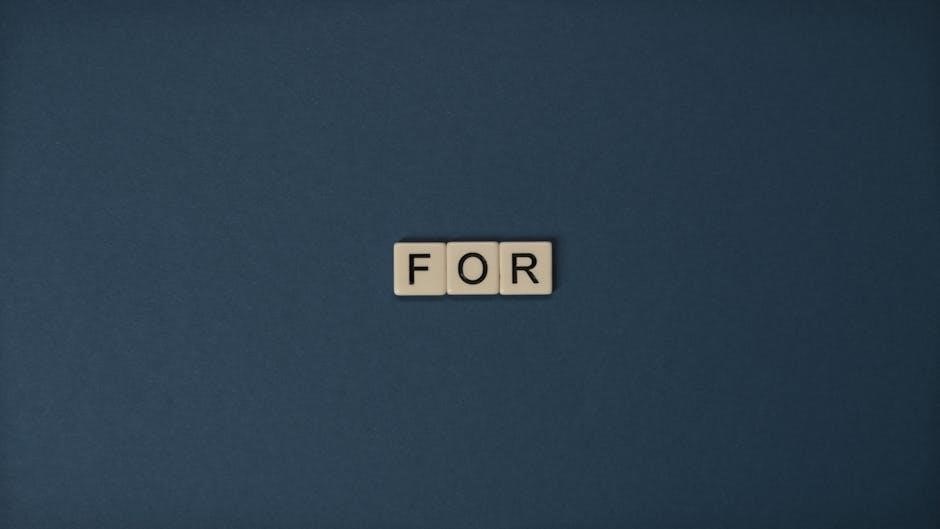Learning French opens doors to a rich cultural heritage and global communication. With French language PDF resources, beginners can access structured courses and essential vocabulary. These materials provide a comprehensive foundation, making learning efficient and enjoyable for those starting their journey.
1.1 Why Learn French?
Learning French is a valuable skill that enhances global communication and cultural understanding. As the second most studied language worldwide, French opens doors to diverse opportunities. It is an official language in numerous international organizations and countries, making it a practical choice for travelers and professionals. French also enriches your cultural perspective, offering access to renowned literature, cinema, and art. Additionally, learning French can boost cognitive abilities and memory. With French language PDF resources, beginners can easily start their journey, gaining essential skills that add interest and satisfaction to their personal and professional lives. It truly makes you a global citizen.
1.2 Importance of French in the Global Context
French holds significant importance globally, being an official language in international organizations like the United Nations, EU, and UNESCO. It is widely spoken across Africa, Europe, and the Caribbean, making it a key language for diplomacy and business. French is also a bridge to diverse cultures, fostering global understanding. In the hospitality and tourism industries, French is highly valued, enhancing career opportunities. With French language PDF resources, learners can tap into these global connections, gaining a competitive edge in today’s interconnected world. Mastering French expands your professional and cultural horizons, making it an invaluable skill for the modern era.
Basic French Vocabulary for Beginners
Mastering basic French vocabulary is essential for beginners. Start with common phrases and essential words for everyday conversations. Utilize French language PDF resources to build a strong foundation and enhance your learning journey.
2.1 Common Phrases and Greetings
Mastering common French phrases and greetings is a great starting point for beginners. Essential expressions like Bonjour (Hello), Merci (Thank you), and Au revoir (Goodbye) are fundamental. Greetings such as Bonjour, madame/monsieur (Hello, ma’am/sir) and Comment ça va? (How are you?) are widely used. Phrases like S’il vous plaît (Please) and Excusez-moi (Excuse me) demonstrate politeness. These phrases are often included in French language PDF resources, making them easily accessible for practice. Learning these basics helps build confidence and lays the groundwork for more complex conversations.
2.2 Essential Vocabulary for Everyday Conversations
Building a strong foundation in everyday vocabulary is crucial for effective communication. Common topics include food, shopping, and numbers. Phrases like Je voudrais une carafe d’eau, s’il vous plaît (I would like a glass of water, please) are practical. Learning words for family members, such as ma mère (my mother) and mon frère (my brother), is also essential. French language PDF resources often organize these terms into thematic lists, making them easy to study. Mastering this vocabulary enables learners to engage in basic yet meaningful interactions, enhancing their confidence in real-life scenarios.
2.3 Building a Strong Foundation in French Words
Mastering basic French words is the cornerstone of language proficiency. Start with high-frequency vocabulary like greetings (Bonjour, Salut) and common expressions (Merci, De rien). Focus on numbers, days of the week, and essential verbs such as être (to be) and avoir (to have). Use flashcards or French language PDF guides to organize and review these terms. Practice pronunciation regularly to ensure accuracy. Consistency is key; dedicating time daily to learn and repeat these words will create a solid base for more complex language skills. This foundation will make future learning smoother and more enjoyable.

French Language Structure and Grammar
French grammar guides in PDFs provide clear rules for sentence structure, verb conjugations, and gendered nouns, essential for building a strong linguistic foundation and mastering tenses.
3.1 Understanding French Pronunciation
Mastering French pronunciation can be challenging due to silent letters, accents, and unique sounds. French language PDF guides often include phonetic symbols and audio aids to help learners. These resources emphasize proper intonation and stress, crucial for clear communication. Beginners can benefit from free PDF lessons that focus on pronunciation, such as those offered by FrenchPod101. Additionally, interactive French PDF materials provide exercises to practice tricky sounds, ensuring a solid foundation for speaking confidently and accurately.
3.2 Basic Grammar Rules for Beginners

French grammar can seem complex, but starting with basics like verb conjugations and sentence structure is key. French language PDF resources provide clear guides for beginners, covering essential rules such as gendered nouns and adjective placement. These materials often include exercises to practice common verb forms, like être and avoir. Interactive PDF lessons also offer tips for mastering sentence construction and punctuation. By focusing on these fundamentals, learners can build a strong grammatical foundation, making further language learning more accessible and enjoyable.
3.3 Gender and Number in French Nouns
In French, nouns are categorized by gender (masculin or féminin) and number (singulier or pluriel). Understanding gender is crucial as it affects articles, adjectives, and pronouns. For example, le (the) for masculine nouns and la for feminine nouns. Pluralization typically involves adding -s or -x, with exceptions for irregular nouns. French language PDF resources often include exercises to practice gender identification and number agreement, helping beginners master these foundational concepts through clear examples and structured lessons.
French Language Resources for Beginners
French language PDF resources offer a variety of structured lessons, vocabulary lists, and exercises. These materials provide essential tools for beginners to learn effectively and confidently.
4.1 Free French Language PDF Books
Free French language PDF books are an excellent resource for beginners. Websites like FrenchPod101 offer comprehensive PDF lessons with grammar guides, vocabulary lists, and exercises. These materials are designed to help learners build a strong foundation in French. Additionally, platforms provide cheat sheets and phrase books that focus on everyday conversations. Resources like “BASIC FRENCH LANGUAGE LEARNING” and “Basic French Course for The Hotel Industry” are available for free download. These books cover essential topics, making them ideal for self-study and structured learning. They are accessible, convenient, and perfect for those starting their French journey.
4.2 Paid French Language Courses and eBooks
Paid French language courses and eBooks offer in-depth learning experiences for beginners. Resources like “Cours de Langue et de Civilisation” by Mauger provide detailed lessons on grammar and culture. Additionally, “Basic French Course for The Hotel Industry” by Catherine Lobo and Sonali Jadhav is tailored for specific professional needs. These paid materials often include interactive exercises, audio pronunciations, and structured progress tracking. They cater to learners seeking comprehensive guidance, ensuring a thorough understanding of the language. Investing in these resources can enhance learning efficiency and provide expert-level instruction for mastering French effectively.
4.3 Interactive French Language PDF Lessons
Interactive French language PDF lessons are a dynamic way to learn. Platforms like FrenchPod101 offer downloadable PDFs with quizzes, audio clips, and exercises. These resources engage learners with practical tasks, enhancing retention. They often include pronunciation guides and cultural insights, making learning immersive. Interactive PDFs allow learners to practice at their own pace, reinforcing vocabulary and grammar. They are ideal for beginners seeking a hands-on approach to mastering French. These lessons combine visual, auditory, and interactive elements, creating a well-rounded learning experience tailored to individual needs and preferences. They are a valuable tool for effective language acquisition.
Tips for Effective French Language Learning
Set realistic goals, use flashcards for vocabulary, and practice daily. Engage with PDF resources for structured learning. Stay consistent and track your progress for success.
5.1 Setting Realistic Goals for Beginners
Setting realistic goals is crucial for effective French learning. Start with achievable milestones, like mastering basic greetings or common phrases weekly. Use French language PDF resources to track progress and stay organized. Break goals into manageable parts, focusing on vocabulary, grammar, and pronunciation. Celebrate small achievements to stay motivated. Align goals with your schedule to ensure consistency. Regular review and adjustment of objectives will help maintain momentum. Clear, attainable targets make learning enjoyable and rewarding, keeping you focused on your journey to fluency.
5.2 Using Flashcards and Memory Aids
Flashcards and memory aids are powerful tools for memorizing French vocabulary and phrases. They help beginners retain information effectively by associating words with meanings or images. French language PDF resources often include flashcard templates or interactive exercises. Using apps or physical cards can make learning engaging and portable. Memory aids like mnemonics or rhymes also enhance retention. Regular review of these tools ensures consistent progress. They are especially useful for beginners, as they simplify complex concepts and make learning fun. Incorporate flashcards into your daily routine for an effective learning tool;
5.3 Practicing Regularly for Consistency
Consistent practice is key to mastering French. Dedicate time daily to review vocabulary, phrases, and grammar. Use French language PDF resources like flashcards or interactive lessons to stay engaged. Regular practice helps build confidence and improves retention. Even short sessions can make a significant difference. Incorporate activities like speaking exercises or writing short sentences to reinforce learning. Over time, consistent effort leads to fluency and a stronger command of the language. Make practice a habit to ensure steady progress in your French learning journey.

Cultural Aspects of the French Language
Learning French connects you to its rich culture, traditions, and history. Understanding these aspects enhances language learning and appreciation of French-speaking communities worldwide.
6.1 Understanding French Culture Through Language
Learning French is not just about mastering grammar and vocabulary; it’s also about immersing yourself in the rich cultural heritage of France and its people. The French language is deeply intertwined with its history, art, and traditions. By studying French language PDF resources, beginners can gain insights into cultural nuances, such as idiomatic expressions and historical contexts. These materials often include sections on etiquette, regional variations, and cultural practices, helping learners appreciate the diversity of French-speaking communities. Understanding these aspects enhances not only language skills but also the ability to connect with native speakers on a deeper level.
6.2 Regional Variations in French Speaking
French is spoken across various regions, each with unique dialects and expressions. From the distinct accents of Quebec to the diverse dialects in Belgium and African countries, these variations enrich the language. French language PDF resources often highlight these regional differences, helping beginners understand the diversity of French-speaking communities. For instance, Québécois French differs significantly from European French in pronunciation and vocabulary. These variations not only add cultural depth but also prepare learners for real-life conversations in different contexts, making their language skills more adaptable and effective in global communication.
6.3 Etiquette and Politeness in French Communication
Etiquette and politeness are deeply rooted in French culture, reflecting in language use. Formal greetings like “Bonjour” and “Merci” are essential for respectful interactions. Using formal pronouns “vous” instead of “tu” with strangers or elders is a key aspect of politeness. French language PDF resources often include sections on polite expressions and formal communication, helping beginners navigate social norms. Mastering these elements ensures effective and respectful communication, making learners feel more confident in both personal and professional settings while immersing in the French-speaking world.

Tracking Progress in French Language Learning
Tracking progress in French learning involves setting milestones, using quizzes, and seeking feedback. French language PDF resources offer structured exercises to monitor improvement effectively for beginners.
7.1 Setting Milestones for Beginners
Setting milestones is crucial for tracking progress in French learning. Beginners can use French language PDF resources to break their journey into achievable goals, such as mastering basic greetings or common phrases. These resources often include structured lessons that align with specific milestones, helping learners stay focused and motivated. By celebrating each milestone, beginners build confidence and maintain a steady pace in their learning process. Regularly reviewing these goals ensures consistent improvement and keeps learners on track to fluency.
7.2 Using Quizzes and Tests to Measure Progress
Quizzes and tests are essential tools for assessing progress in French learning. French language PDF resources often include interactive quizzes that help beginners evaluate their understanding. These tests cover vocabulary, grammar, and pronunciation, providing immediate feedback. By regularly using these tools, learners can identify strengths and areas for improvement. Tracking scores over time reveals progress and motivates continued effort. Incorporating quizzes into a study routine ensures a comprehensive understanding of the material and helps build confidence in using the language effectively. Consistent testing is key to achieving fluency and mastering French efficiently.

7.3 Seeking Feedback from Native Speakers
Seeking feedback from native French speakers is a powerful way to refine language skills. French language PDF resources often include exercises and conversation guides that facilitate interaction. Native speakers can provide insights into pronunciation, grammar, and cultural nuances, enhancing learning. Regular feedback helps identify areas for improvement and builds confidence. Many French PDF lessons encourage connecting with native speakers through language exchange programs or online communities. This direct interaction ensures learners receive authentic feedback, accelerating their progress and helping them achieve fluency more effectively. Feedback from natives is invaluable for mastering the subtleties of the French language.

Overcoming Common Challenges
Mastering French pronunciation and grammar complexity can be daunting. French language PDF resources offer structured lessons to tackle these challenges, helping beginners stay motivated and progress steadily.
8.1 Difficulties in French Pronunciation
French pronunciation can be challenging due to unique sounds like accents and silent letters. French language PDF resources often include phonetic guides and practice exercises to help beginners master these sounds. While it’s impossible to fully learn pronunciation from a book alone, structured PDF lessons provide clear examples and drills. Regular practice with audio tools alongside PDF materials is essential for improving accuracy. These resources also highlight common pitfalls, such as nasal sounds and vowel pronunciation, offering tips to overcome them effectively. Consistency and repetition are key to achieving fluency in French pronunciation.
8.2 Managing Grammar Complexity
French grammar can be complex, especially for beginners, due to rules like gendered nouns, verb conjugations, and sentence structure. French language PDF resources simplify these concepts with clear explanations and exercises. They often break down grammar rules into manageable sections, providing practical examples and drills. These materials also highlight common mistakes and offer tips to avoid them. By using structured PDF guides, learners can gradually build their understanding and confidence. Regular practice with these resources helps in mastering tricky aspects like tenses and pronouns, making grammar less intimidating and more approachable for those starting their French learning journey.

8.3 Staying Motivated During the Learning Process
Staying motivated while learning French is crucial for long-term success. French language PDF resources offer structured lessons and achievable goals, helping beginners track progress. Celebrating small milestones, like mastering a new phrase or completing a chapter, boosts confidence; Engaging with interactive PDFs and receiving feedback from native speakers can also enhance motivation. Surrounding yourself with French media, like music or films, adds enjoyment to the learning process. Consistency and positive reinforcement are key to maintaining enthusiasm and overcoming challenges, ensuring a rewarding journey toward fluency.
Mastering French is a rewarding journey, especially with comprehensive PDF guides. Stay motivated, embrace the process, and enjoy the cultural richness it brings.
9.1 Summarizing Key Points for Beginners
Learning French for beginners starts with essential vocabulary and phrases. French language PDF resources offer structured lessons, covering greetings, everyday conversations, and grammar basics. These materials emphasize pronunciation and cultural insights, making learning accessible. Beginners should focus on building a strong foundation, practicing regularly, and using flashcards for memory aid. Setting realistic goals and seeking feedback from native speakers enhances progress. Staying motivated and leveraging interactive PDF lessons ensures consistent improvement. With dedication, learners can master French and unlock its cultural and global benefits.
9.2 Encouragement for Continued Learning
Embrace the journey of learning French with enthusiasm and persistence. Celebrate small milestones, like mastering basic phrases or understanding a French song. Utilize French language PDF resources to stay consistent and explore new topics. Remember, every effort brings you closer to fluency. Engage with native speakers and immerse yourself in the culture through films, music, and literature. Stay motivated by setting achievable goals and rewarding progress. Learning French is a rewarding adventure that opens doors to new connections and opportunities. Keep going—you’re making great strides!

9.3 Final Thoughts on Mastering French
Mastering French is a rewarding journey that combines language skills with cultural enrichment. Stay persistent, as progress may be gradual but is always fulfilling. Leverage French language PDF resources to reinforce learning and explore advanced topics. Surround yourself with the language through music, films, and conversations. Embrace the beauty of French expression and the confidence it brings. Remember, every step forward is a step toward broader communication and deeper cultural understanding. Keep striving, and enjoy the satisfaction of becoming proficient in this elegant and widely spoken language.




